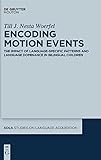Encoding Motion Events : The Impact of Language-Specific Patterns and Language Dominance in Bilingual Children / Till Woerfel.
Material type: TextSeries: Studies on Language Acquisition [SOLA] ; 58Publisher: Berlin ; Boston : De Gruyter Mouton, [2018]Copyright date: ©2018Description: 1 online resource (XX, 379 p.)Content type:
TextSeries: Studies on Language Acquisition [SOLA] ; 58Publisher: Berlin ; Boston : De Gruyter Mouton, [2018]Copyright date: ©2018Description: 1 online resource (XX, 379 p.)Content type: - 9781501516498
- 9781501507915
- 9781501507977
- Bilingualism in children -- France -- Case studies
- Bilingualism in children -- Germany -- Case studies
- Bilingualism in children
- French language -- Study and teaching -- Turkish speakers
- German language -- Study and teaching -- Turkish speakers
- Motion in language
- Second language acquisition
- LANGUAGE ARTS & DISCIPLINES / Linguistics / General
- Bilingualism
- Crosslinguistic Influence
- Language Dominance
- Motion Events
- 404/.2083 23
- P115.2
- P115.2
- online - DeGruyter
- Issued also in print.
| Item type | Current library | Call number | URL | Status | Notes | Barcode | |
|---|---|---|---|---|---|---|---|
 eBook
eBook
|
Biblioteca "Angelicum" Pont. Univ. S.Tommaso d'Aquino Nuvola online | online - DeGruyter (Browse shelf(Opens below)) | Online access | Not for loan (Accesso limitato) | Accesso per gli utenti autorizzati / Access for authorized users | (dgr)9781501507977 |
Frontmatter -- Acknowledgments -- Contents -- List of Figures -- List of Tables -- Abbreviations -- 1. Introduction -- 2. Multicompetence in child bilingualism -- 3. Motion events in language and cognition -- 4. Motion events in first and bilingual language acquisition -- 5. Implications and general assumptions -- 6. Methodology -- 7. Study on language dominance patterns and motion encoding by Turkish-German and Turkish-French bilinguals -- 8. General discussion and future directions -- Appendix -- References -- Index
restricted access online access with authorization star
http://purl.org/coar/access_right/c_16ec
Children who grow up as second- or third-generation immigrants typically acquire and speak the minority language at home and the majority language at school. Recurrently, these children have been the subject of controversial debates about their linguistic abilities in relation to their educational success. However, such debates fail to recognise that variation in bilinguals’ language processing is a phenomenon in its own right that results from the dynamic influence of one language on another. This volume provides insight into cross-linguistic influence in Turkish-German and Turkish-French bilingual children and uncovers the nature of variation in L1 and L2 oral motion event descriptions by evaluating the impact of language-specific patterns and language dominance.The results indicate that next to typological differences between the speakers’ L1 and L2, language dominance has an impact on the type and direction of influence. However, the author argues that most variation can be explained by L1/L2 usage preferences. Bilinguals make frequent use of patterns that exist in both languages, but are unequally preferred by monolingual speakers. This finding underlines the importance of usage-based approaches in SLA.
Issued also in print.
Mode of access: Internet via World Wide Web.
In English.
Description based on online resource; title from PDF title page (publisher's Web site, viewed 25. Jun 2024)


